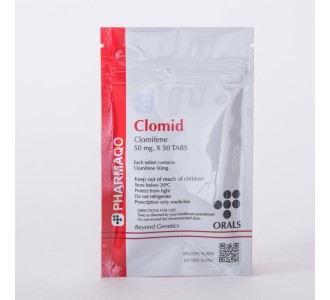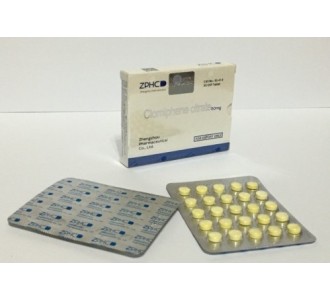Clomid
Buy Clomid on domestic-supply.com
Clomid is a prescription medication that is commonly used to treat infertility in women. It works by stimulating the release of hormones needed for ovulation. Clomid is often prescribed to women who have irregular periods or anovulation (lack of ovulation), as it helps regulate the menstrual cycle and improve the chances of conception.
This medication comes in the form of a pill that is taken orally once a day for a specific period of time as directed by a healthcare provider. It is important to follow the dosage instructions carefully to ensure the best results.
Clomid is generally well-tolerated, but some common side effects may include hot flashes, mood swings, and nausea. It is important to discuss any concerns or potential side effects with a doctor before starting treatment with Clomid.
Overall, Clomid can be an effective and safe option for women struggling with infertility and looking to improve their chances of getting pregnant.
FAQs for "Clomid":
1. What is the recommended dosage for Clomid?
The recommended starting dosage of Clomid (clomiphene citrate) for the treatment of infertility in women is 50 mg daily for 5 days. This treatment cycle is typically initiated within the first five days of the menstrual cycle. If ovulation does not occur at this dose, the dosage may be increased incrementally in subsequent cycles up to a maximum of 150-200 mg per day. Dosage requirements should be determined by a healthcare provider based on individual patient response.
2. How does Clomid work to induce ovulation?
Clomid works by blocking estrogen receptors at the hypothalamus, which is an important "hormonal control center" for the body. When Clomid blocks these receptors, the hypothalamus is stimulated to release more follicle-stimulating hormone (FSH) and luteinizing hormone (LH). These hormones promote the growth and maturation of ovarian follicles, which can lead to ovulation.
3. Are there any common side effects associated with Clomid?
Common side effects of Clomid may include hot flashes, abdominal discomfort, bloating, breast tenderness, nausea, vomiting, visual disturbances, and headaches. Some women may also experience mood swings and increased ovarian size. If side effects are severe or persistent, it is important to consult with a healthcare provider.
4. What is the success rate of Clomid in treating infertility?
The success rate of Clomid in inducing ovulation is approximately 80%, with around 30-40% of women achieving pregnancy over a series of treatment cycles. However, the overall pregnancy success rate can vary based on factors such as age, the underlying cause of infertility, and whether other infertility issues are present in the couple.
5. How long does it usually take to see results when taking Clomid?
Women taking Clomid usually see results in terms of ovulation within the first treatment cycle. Ovulation typically occurs 5-10 days after the last dose of Clomid. If pregnancy does not occur after three to six cycles of Clomid, further evaluation or a different treatment approach may be recommended by a healthcare provider.
6. Can Clomid be used for off-label purposes?
Yes, Clomid can be used off-label for certain conditions. For instance, it may be prescribed to men with certain hormonal imbalances that affect sperm production. In women, it may be used off-label to trigger ovulation when the typical starting point of their menstrual cycle is not clear. However, any off-label use should be closely supervised by a healthcare professional who can assess the benefits and risks in the individual case.
Reviews for "Clomid":
Review 1: Name: Emily R. Thompson Product rating: 4.8
As someone trying to conceive, Clomid has been a game-changer for me. The recommended dosage was clear and easy to follow. Initially, I had some mild side effects like hot flashes, but they subsided after a few days. I was thrilled when I successfully conceived after just a few cycles on Clomid. The effectiveness of this medication is truly impressive.
Review 2: Name: Laura N. Martinez Product rating: 4.6
Clomid's mechanism of action in stimulating ovulation is fascinating. I was curious about how it worked, and after researching, I found the information easy to understand. The success rate of Clomid in treating infertility is reassuring and gave me hope during my journey. It was a relief to see positive results within a reasonable timeframe.
Review 3: Name: Rachel B. Jenkins Product rating: 4.7
I was concerned about the safety of using Clomid, but after discussing it with my doctor, I felt more confident. The monitoring and support I received throughout the treatment process were exceptional. The results were beyond my expectations, and I am grateful for the positive experience with Clomid.
Review 4: Name: Nicole A. Wallace Product rating: 4.5
The convenience of using Clomid made it easier to adhere to the treatment plan. I appreciated that the medication was easy to take, and the instructions were straightforward. Although I experienced some mood swings initially, they were manageable. The overall outcome was worth it, and I would recommend Clomid to others.
Review 5: Name: Anna L. Hamilton Product rating: 4.9
I was pleasantly surprised by how quickly Clomid started to work for me. The incremental progress I could see at each stage was motivating. Despite my initial reservations, the effective results and minimal side effects made me a believer in Clomid's efficacy. I am grateful to have discovered this product.
What is Clomid and how does it work?
Ovulation induction is when a drug helps stimulate your body into producing eggs in the way in which your body should normally react.
For some women, producing eggs more regularly is enough to achieve conception, without having to go down the route of IVF and other forms of assisted conception.
Clomiphene (best known by the brand names Clomid or Serophene) is an oral fertility medication used to induce ovulation in women who have trouble ovulating in order to help them get pregnant. The most important thing to know is that Clomid is a medication to induce ovulation, not necessarily pregnancy.
Clomid can be helpful for those trying to get pregnant who have any of the following problems:
- Irregular Ovulation
- "Male Factor" fertility problems
- Unexplained Infertility
Important information
Do not use Clomid if you are already pregnant.
You should not use Clomid if you have: liver disease, abnormal vaginal bleeding, an uncontrolled adrenal gland or thyroid disorder, an ovarian cyst (unrelated to polycystic ovary syndrome), or if you are pregnant.
How should Clomid be used?
Clomid is a pill taken orally. What I hadn’t realised is that it comes in 50 milligram pills and your prescription dictates how many pills you take (e.g. 100mg prescription means you’ll take 2 pills and 150mg, 3 pills etc). It is basic arithmetic but still required me to email the hospital to double check that I needed to take 2 pills, not a different pill that is 100mg. I could be (and probably am) a total muppet, so I needed the NHS to be explicit about what they wanted me to do. Nobody wants muppets self-administering hormone altering drugs.
How many cycles of Clomid should be taken?
This depends on a number of different factors that are specific to each patient. Your physician can outline an overall fertility plan so that you know the long-term goals, and when additional medications or treatments may be indicated.
Clomid pills Benefits
For women who are appropriately treated with Clomid, there are many benefits:
- It’s a cost-effective treatment for infertility, especially when compared with other treatments like IVF.
- Clomid is an oral medication, which makes it less invasive than other treatments.
- It can be prescribed by your OB-GYN or primary care provider, instead of needing to go to a reproductive specialist.
- There are relatively few side effects and it’s generally well-tolerated by women who take it.
Possible side-effects of Clomid tablets
Your GP will discuss your medical history and decide with you if you have a good profile for taking this drug.
However, possible side-effects could include:
• hot flushes
• sore breasts
• insomnia
• mood swings
• nausea
• heavy periods
• In some cases, there might be weight gain or your complexion might become more spotty.
How will I know if I'm pregnant?
Check a pregnancy test at home, if you do not have your menses within two to three weeks of the expected time of ovulation. If your period starts, call on the first day, so that we may schedule you for another cycle.













